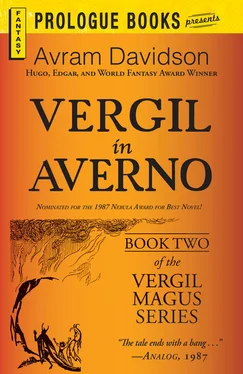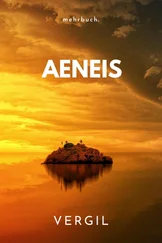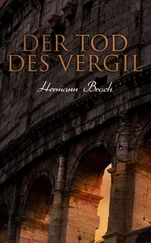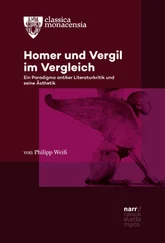Avram Davidson - Vergil in Averno
Здесь есть возможность читать онлайн «Avram Davidson - Vergil in Averno» весь текст электронной книги совершенно бесплатно (целиком полную версию без сокращений). В некоторых случаях можно слушать аудио, скачать через торрент в формате fb2 и присутствует краткое содержание. Жанр: Фэнтези, на английском языке. Описание произведения, (предисловие) а так же отзывы посетителей доступны на портале библиотеки ЛибКат.
- Название:Vergil in Averno
- Автор:
- Жанр:
- Год:неизвестен
- ISBN:нет данных
- Рейтинг книги:3 / 5. Голосов: 1
-
Избранное:Добавить в избранное
- Отзывы:
-
Ваша оценка:
- 60
- 1
- 2
- 3
- 4
- 5
Vergil in Averno: краткое содержание, описание и аннотация
Предлагаем к чтению аннотацию, описание, краткое содержание или предисловие (зависит от того, что написал сам автор книги «Vergil in Averno»). Если вы не нашли необходимую информацию о книге — напишите в комментариях, мы постараемся отыскать её.
Vergil in Averno — читать онлайн бесплатно полную книгу (весь текст) целиком
Ниже представлен текст книги, разбитый по страницам. Система сохранения места последней прочитанной страницы, позволяет с удобством читать онлайн бесплатно книгу «Vergil in Averno», без необходимости каждый раз заново искать на чём Вы остановились. Поставьте закладку, и сможете в любой момент перейти на страницу, на которой закончили чтение.
Интервал:
Закладка:
“Ser.”
Again the silence. Again, from not very close by, the drip and drop. Was it indeed water? For one single second he thought it was a water-clock, drip-dripping away the hours of his life; for another second he thought it might be the blood of a bull: They were deep down somewhere: Could the Taurobolium, the Mithraeum, be deeper?
“Ser.” A second man spoke, the second from the right. “Ser, you have come here to encompass the death of the king.”
Astonishment the most absolute swept over Vergil. And some chill fear. There came to him the account of how, every second year, the Archiflaman of Rybothe, distant even from the far-distant Pamirs, played at dice with someone chosen by lot to personate Death. The forfeit: the fate of Rybothe. And as the fate of Rybothe was far too important to be risked upon the cast of a die, the Archiflaman always played with loaded dice. “I ‘came here to — ’? What? I am on trial! What ‘king’? No, my men. Me sers, no, I assure you. What is this? It is quite false. No man’s death has — ”
Some faint savor of some other conference (if such this was) he had attended here. . but yet how different this tarrying silence (and these men gathered here) from the gross clamor of the magnates …!
Then: “Cadmus!” cried Vergil, the word bursting from his startled lips. “It is Cadmus whom you mean! No — ”
To say that their faces were calm was to understate. Their faces seemed fixed, frozen. Said the one seated third from right, “It is certainly Cadmus whom we mean. And we certainly see that you do not know. Then. . But …” He turned first one way, then the other, looked at his fellows. “How can we ask him? If he does not know?”
An endless moment passed. Then the fourth raised his eyes as though at something well above, then brought them down and, gazing straight at Vergil, said, “I do not know if my lord. . pardon. . my ser. . I do not know if he has seen the rose.”
Vergil’s eyes they were which now looked up, up. Sure enough, although the table that stood between him and them was such a small one it seemed pro forma, still: there was the form. A fifth fellow said, “My ser need not accept the constraint, the faith. The trust. He has but to say, and he will be taken, with all conceivable courtesy, to another place, whence he may find his way witherso he will. We ought,” he added, having briefly paused, “perhaps have pointed out the rose at the very first. But we have. . we have had. . much upon our minds.”
There it hung, though how it hung he could not clearly see, and how this freshly blooming rose (he thought, almost infinitely briefly, of the famous “twice-blooming roses of Paestum,” dismissed it: the bush bloomed twice, but not the rose) came even to be hanging here in this city where no flowers bloomed and no birds sang, he could not imagine. No: He could imagine, but it required some exercise of imagination. And it would have, must have, required some exercise of arts other than mere gardening. The rose hung over the table and they sat around the table and so they were sitting sub rosa, underneath the rose.
And the rose pledged secrecy. When it did not indeed pledge silence.
Silence there certainly was, it was already springing from the situation itself, from those who, caught up in the situation, sat around the. . almost. . secret, the sacred. . almost. . table. And silence it was that spun round Vergil like a web. Who at length said, “Me sers, you know I have been brought here by the Very Rich City of Averno to perform a task. A compact unwritten subsists between myself and this city, and the agentry and polity of this city are the magnates. This you must all know. But there is something I do not know, and that is how far I may bind myself to secrecy — if that secrecy may also bind me to some action — or, for that matter, some inaction — against the magnates.”
Silence. And the drip-drop of water. If water it was.
And then the last of the men sitting across from him on the other side of the table said, “He does not know.”
And, speaking once again in his turn, the first of them said, very quietly, very simply, and very tiredly, “Tell him.”
Someone who had this while been standing somewhat behind Vergil, though at a slight angle, stepped forward. The air was flat and still. But it did not stink, there was no omnipresent beat and thump. Were they really in Averno? The one who stepped forward Vergil had known from some several years before. It only now occurred to him that never had he known the man’s name. He who had once been the beadle of the Second Secret School in Sevilla, so very far away, now gently moved his hand and slowly opened it and he laid one languid finger on the edge of the so small table. “Look, then, student,” he said.
And in the polished surface of the table the student (and was he not still a student? was he not still learning? now, at this moment, even now?) saw himself running a race he had thought long forgotten by he himself and so (as so one thinks) by most of all the world: though of course most of all the world had never known of it. He recognized himself. He knew why the fear upon his face. He knew the trick whereby he had, if not indeed won the race, for there could be no one winner, had avoided being the one loser. He saw, though, that there was something different now. Deep in the polished surface of the table, deep below the table’s surface, he saw himself dodging, panting, turning here and turning there, and never ceasing to run — it had not been so, that way, at all — Wait. Was this the same race? One which he had already run? Or one which he was yet to run?
(Behind, this time, whom to hide?)
A race already run? A race yet to be run? Or one which he, though he had known it not, was already running.
The table. Look, then, student . . A man stood beneath an arch, outlined by light, though else was dim. A figure brutal, strong, and coarse, watching the approach of the runner with a steady eye. This one’s broad, blunt face had something of the look of an experienced gladiator, but there was in it no element of that caution akin to fear. And in his huge hands (huger, yet, his arms! his shoulders!) a huge hammer.
Said the once-beadle, “Borbo is his name. A butcher is what he is. He stuns the oxen. And when they stumble, then he plunges in the knife.”
And then Vergil saw the knife.
And then Vergil heard the voice. The voice never came from that butcher beneath the arch; it was toneless and dry and it was as though some clerk was reading something, one who reads a document whose contents are well known, yet need be read once more, before the signet is affixed. The voice had been speaking awhile before Vergil clearly made out words, the commencement of the line had been lost and he did not try to recover it…. one Vergil, a wizard, sorcerer, nigromant and necromant. From him the protection of the Laws and the Magnates of the Very Rich City is withdrawn, and he is proclaimed Outlaw. He may be duped, drugged, drawn, stabbed, strangled, stoned; he may be poniarded, poisoned, bludgeoned, thrust through, or cast down. It be licit that he be burned or bled or hamstrung or hanged…. And so the dreadful list, like a litany, ran on and on.
And on …
He was not aware of its stopping, but he was aware of its having stopped. And next he was wary and he was aware of someone saying to him, “But over you may be placed the power of the friends and councilors of Cadmus the King. And his and their protection may be yours. Twice sacred is he in his person and in his power; for, for one, he has been crowned a king and is thus on earth a reflection of the sacred kings of heaven and of hell; and for another, he is mad, and madness is like wisdom a gift of the gods. Averno is here. And the Roman Emperor is far away. And it may be that the Roman Emperor knows you not.”
Читать дальшеИнтервал:
Закладка:
Похожие книги на «Vergil in Averno»
Представляем Вашему вниманию похожие книги на «Vergil in Averno» списком для выбора. Мы отобрали схожую по названию и смыслу литературу в надежде предоставить читателям больше вариантов отыскать новые, интересные, ещё непрочитанные произведения.
Обсуждение, отзывы о книге «Vergil in Averno» и просто собственные мнения читателей. Оставьте ваши комментарии, напишите, что Вы думаете о произведении, его смысле или главных героях. Укажите что конкретно понравилось, а что нет, и почему Вы так считаете.












